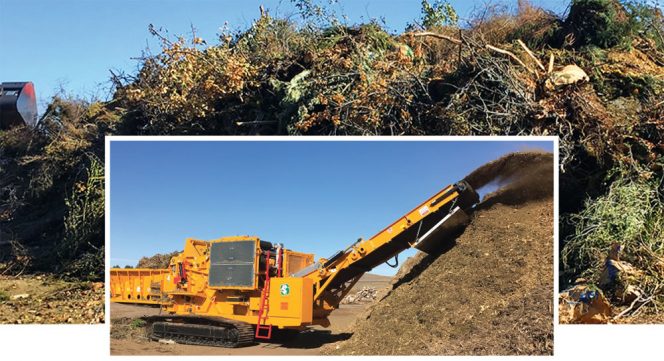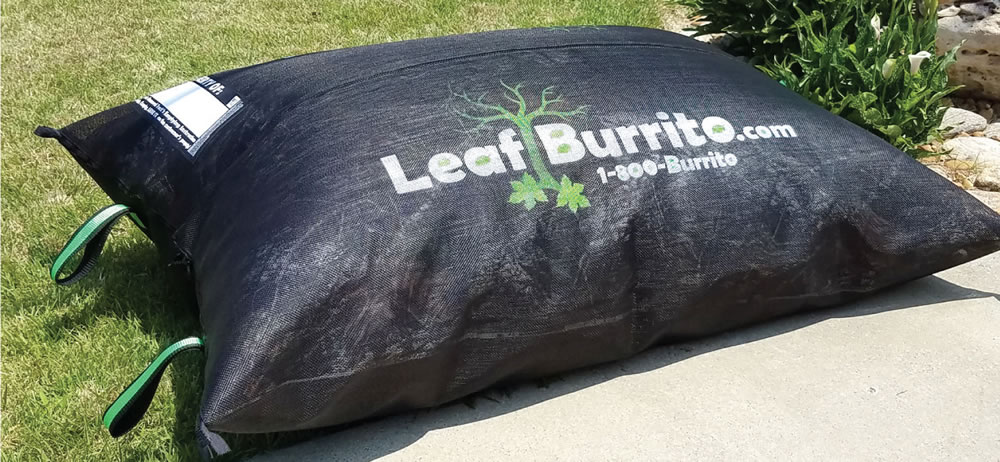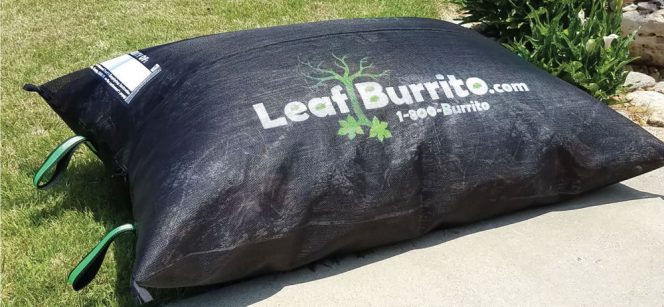BioCycle July 2018
Charlotte, North Carolina: Reusable Leaf Bag
Marc Mataya, a Charlotte resident and inventor, created the Leaf Burrito®, a reusable yard trimmings curbside collection bag, which is designed to help eliminate single-purpose plastic bags. The “burrito bag” holds more than 4 large lawn bags worth of leaves, according to Mataya. It starts completely flat for loading then closes up with heavy-duty zippers. “I came up with the idea several years ago … however, tarps were not approved [curbside collection containers] by the City of Charlotte Solid Waste Department,” says Mataya. “I have always had a strong passion for environmental sustainability, green initiatives and with all the current news on what plastic contamination is doing across the world I wanted to do my part.” The bag is now approved by the City of Charlotte for curbside servicing; it is emptied and then left in the yard. The Leaf Burrito® is constructed of heavy-duty mesh, with 5 high-strength straps for dragging, carrying, lifting, loading and emptying. It won the 2017 Sustain Charlotte Award in the Waste Reduction category. “We are moving into mass production with public support and investment through Crowdfunding,” adds Mataya.
Albany, New York: Revised SSO Composting Regulatory Tiers
The New York State Department of Conservation (NYDEC) revised its Part 360 Solid Waste regulations and expanded the limits to which a composting facility is considered exempt, registered or permitted. One goal of the revisions, effective in November 2017, was to address the expansion of community composting in the state. The following revisions apply to Source Separated Organics (SSO) Composting that includes food scraps:
Exempt: Pre Nov. 2017, there were no exemptions for source separated composting that included food scraps.
Post Nov. 2017 (361-3.2(a)(2)), a composting facility that accepts, measured on a monthly average, no more than 1,000 pounds (lbs) or 1 cubic yard (cy), whichever is greater, of source separated organics (SSO) per week is exempt, provided no more than 2,000 lbs are accepted in any one week.
Registration Required: Pre Nov. 2017, a composting facility that accepted no more than 1,000 cy/year of SSO or a composting facility for food processing waste had to register.
Post Nov. 2017 (361-3.2(b)(2)), a composting facility that accepts no more than 5,000 cy or 2,500 wet tons, whichever is less, of SSO per year, provided that no more than 800 cy are accepted in any month, has to register.
Permit Required: A permit is required to compost any amount of SSO above the registered amount, which also was the case prior to the Nov. 2017 revisions (361-3.2(d) & (e)).
Under the revised Part 360 Solid Waste regulations, NYDEC is now regulating mulch processing facilities.
Rapid City, South Dakota: Yard Trimmings Composting Update
 The Rapid City Solid Waste Division has been operating a mixed MSW composting facility since 2003. It uses an agitated bay in-vessel composting system now marketed by BDP Industries. It also composts a 50:50 mix of mixed MSW and yard trimmings, which is composted in the bays as well. Finally, the division has a yard trimmings only composting operation, which is outdoors. “We receive an average of 18,000 tons of yard trimmings annually,” notes Jeff Barber, who has worked at the Rapid City Solid Waste Division for 18 years and currently manages its yard trimmings and landfill operations. A significant amount is hauled in by landscape and mowing businesses in the surrounding region. Additionally, the facility receives a lot of pine trees and forest debris from commercial fire remediation contractors who clean up around homes, trails, and parkways.
The Rapid City Solid Waste Division has been operating a mixed MSW composting facility since 2003. It uses an agitated bay in-vessel composting system now marketed by BDP Industries. It also composts a 50:50 mix of mixed MSW and yard trimmings, which is composted in the bays as well. Finally, the division has a yard trimmings only composting operation, which is outdoors. “We receive an average of 18,000 tons of yard trimmings annually,” notes Jeff Barber, who has worked at the Rapid City Solid Waste Division for 18 years and currently manages its yard trimmings and landfill operations. A significant amount is hauled in by landscape and mowing businesses in the surrounding region. Additionally, the facility receives a lot of pine trees and forest debris from commercial fire remediation contractors who clean up around homes, trails, and parkways.
Logs, trees, branches, and other materials are run through a recently procured CBI 6800BT horizontal wood grinder. Ground yard trimmings are put in windrows. “What we grind now in a day used to take us three to four days,” says Barber. “The grinder keeps our bulk pile [of incoming material] smaller so we don’t have to worry about fire. In years past we’ve had some major fires out here when the bulk pile got too big. We’re able to manage it well now.” The windrows are watered and turned, and kept between 140° to 150°F, for 14 days.
Los Maitenes, Chile: Soil Remediation With Compost — Six Years Later
A team of Chilean researchers returned to a site contaminated with metals six years after remediation with two treatments — one using lime only and one with lime plus compost — to see how well the soil chemistry and planting growth had improved. The site is in the semi-arid Chilean coastal region of the Puchuncavi Valley, with low soil pH (5.4-5.7) leading to high bioavailability of copper in the metals-contaminated site. A single application of amendments (lime with and without compost) took place in 2009, applying 6.7 metric tons/hectare (3 tons/acre) of lime and 133 metric tons/hectare (60 tons/acre) of compost.
After six years, soil pH remained elevated at 7.1 to 7.6, organic matter in the compost treated area declined from 5.2 to 2.4 percent, nitrogen remained relatively constant at 11 milligrams/kilogram (mg/kg) and phosphorus declined from 142 mg/kg to 79 mg/kg. Although soil organic matter levels decreased in the compost-treated area, plant cover remained fairly constant over time, even with the lack of ongoing maintenance or reapplication of compost treatment over the six-year period. Aboveground biomass and plant species composition displayed differences between years one and six, which researchers attributed to differences in climatic conditions over the time frame. The study will appear in the December 2018 issue of Geoderma.
Athens, Georgia: Curbside Compostables Pilot
The City of Athens, in collaboration with the Rural Action Zero Waste Program, is initiating a pilot organics collection program that will run from July 1 through December 1, 2018 and utilize $46,000 from the city’s garbage fund. Residents will have the option to register for the service; compostable materials will be collected weekly with trash and recycling. Rural Action Zero Waste Program has been working with the city of Athens for the past year to develop the program, enabled by an excess in the city’s trash and recycling fund, according to an article in Athens News. The goal is to have 200 to 300 families participating, with ideally 50 to 75 families in each of four residential areas throughout the city.
Logan, Utah: University Improves On-Campus Composting
As a signatory to the American College and University Presidents’ Climate Commitment (ACUPCC), Utah State University (USU) set a goal of reaching carbon neutrality by 2050. In 2015, USU Facilities installed a Green Mountain Technologies Earth Flow in-vessel composting unit to handle about 1,200 pounds/day of postconsumer food waste from the Dining Services and Aggie Ice Cream kitchens, as well as 600 pounds of wood chips from Facilities Landscape Operations and Management. Composting enables the university to reduce the amount of solid waste produced on campus by approximately 25 tons/year and reduce the resulting greenhouse gases.
Utah State University is one of 19 universities being awarded a grant from the 2017-2018 PepsiCo Recycling Zero Impact Fund, which recognizes projects with green initiatives. The composting facility staff will use the funds to purchase a grinder to reduce the wood chips to a finer size to make a smaller particle turf topdressing compost. Shane Richards, the landscape operations and maintenance manager for USU told Utah Public Radio, “Our goal is to save about $16,000 a year in fertilizers and it helps build up a better soil profile so eventually we’ll be using less water and it will hold nutrients better.”











